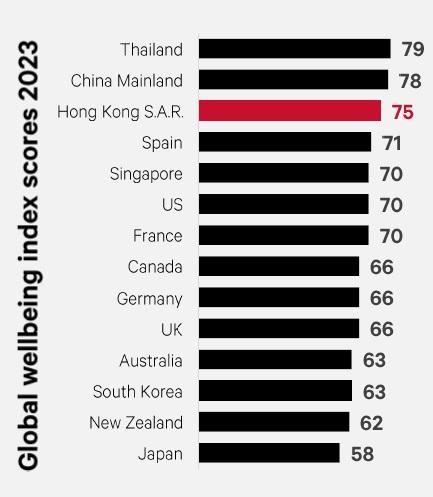share on
Over one-third (37%) of employees said they would fall behind on work responsibilities when their wellbeing is low.
According to the third annual Global Wellbeing Report released by lululemon, while more than two-thirds of people prioritise wellbeing, the worldwide state of wellbeing has not improved since the company's first survey in 2021.

Overall, 67% of people placed wellbeing as a top priority, but 44% felt it was impossible to achieve. This dissonance was felt most in Singapore, South Korea, and Thailand (all at 48%).
Only 12% said their wellbeing was where it should be.
More alarmingly, one in three people worldwide feel their wellbeing is lower than it has ever been before (34%).
The feeling of low wellbeing has created a ripple effect of impact on both the individual and society:
- Global employees reported missing an average of five days of work in the past 12 months due to low wellbeing.
- 58% said they cannot be the best version of themselves when their wellbeing is low.
- 37% of employees said they would fall behind on work responsibilities when their wellbeing is low.
So why this is happening? The report indicated that:
- 30% of respondents said they don’t have the time to think about their wellbeing.
- 33% said they don’t seek help for their wellbeing because they don’t feel comfortable talking about it.
- 51% are deprioritising their wellbeing due to cost concerns.
- 39% said they feel the pressure to conform to societal norms negatively impacts their mental wellbeing.
Additionally, the report revealed that the taboo around mental health is a significantly higher barrier for Gen Z compared to older generations, with 60% of Gen Z wishing they could express how they actually feel, instead of always pretending to be fine (vs. 55% of Gen X, 41% of Boomers and older).
Meanwhile, 48% of individuals identifying as men feel society has made it more difficult for men to speak up about their mental health than women. In Hong Kong, nearly half of men feel their wellbeing is at its lowest point ever, more than 1.5 times that for women. Men are especially likely to feel challenged in their wellbeing largely due to societal pressures to look a certain way (52%), disconnection from the community (49%), and lack of language to express feelings (63%).
Other findings shared:
- Nearly three in five Hong Kong employees say their wellbeing is negatively affected by their job and agree juggling responsibilities at work and home causes them stress.
- Over one-third (68%) of Hong Kong employees think their employer is responsible for their wellbeing, but over half agree their employer is not doing enough to take care of their employees' wellbeing.
- Thailand topped the wellbeing charts, but is threatened by social pressures. Over half of the people surveyed in the country feel pressure to pretend to be happy even when they’re not, and feel the pressure to conform to societal norms negatively impacts their mental wellbeing.
- Mainland China obtained a wellbeing score of 78 (vs 66 global average), showing greater wellbeing and increased optimism and hope. More than two-thirds (67%) of people in Mainland China feel optimistic about the future, and 75% lean into hope to cope with bad news.
- South Korea faced a lack of time as the main barrier to achieving wellbeing. One in two people stressed that having “me time” has become more important to them in the past year.
“While ‘wellbeing’ is recognised as a life priority, the concept along with its barriers have become increasingly overwhelming,” said Gareth Pope, Senior Vice President, lululemon, Asia Pacific. “The heightened expectations around what ‘wellbeing’ should be have led to a downward spiral triggering further anxieties and stress.”
The research was fielded from 1 May 2023 to 6 June 2023, and included a total of 14,000 general population adults globally (1,000 within each of the 14 markets: United States, Canada, United Kingdom, France, Germany, Spain, Australia, New Zealand, Singapore, South Korea, Hong Kong, Mainland China, Thailand and Japan), to evaluate overall wellbeing based on the three wellbeing dimensions: physical wellbeing, mental wellbeing and social wellbeing.
Lead image / Shutterstock
Infographic / lululemon's Global Wellbeing Report
share on
Follow us on Telegram and on Instagram @humanresourcesonline for all the latest HR and manpower news from around the region!
Related topics


